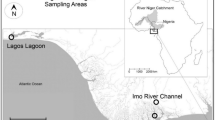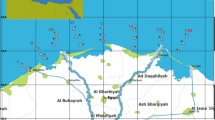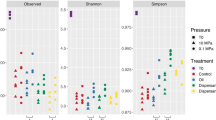Abstract
STUDIES on oil pollution of the marine environment have received considerable attention1, especially work involving the effects of oil spills resulting from tanker accidents such as the Amaco Cadiz2. Very little attention, however, has been devoted to assessing the importance of low level, continuous, inputs of petroleum hydrocarbons to productive estuarine environments. Investigations of hydrocarbon contamination of estuaries and rivers have concentrated mainly on the impact of non-volatile hydrocarbons3 (that is, those hydrocarbons having more than 15 carbon atoms) rather than the volatile hydrocarbons emanating from sewage discharges and industrial effluents such as petroleum refineries. We discuss here the occurrence and possible fate of these volatile hydrocarbons in estuarine systems.
This is a preview of subscription content, access via your institution
Access options
Subscribe to this journal
Receive 51 print issues and online access
$199.00 per year
only $3.90 per issue
Buy this article
- Purchase on Springer Link
- Instant access to full article PDF
Prices may be subject to local taxes which are calculated during checkout
Similar content being viewed by others
References
>National Academy of Sciences, Petroleum in the Marine Environment, 1–107 (NAS, Washington D.C., 1975).
Wolfe, D. A. Mar. Pollut. Bull. 9, 288–292 (1978).
Van Vleet, E. S. & Quinn, J. G. J. Fish. Res. Board Can. 35, 536–543 (1978).
De Souza-Lima, H. & Williams, P. J. Le. B. Estuar. Coast mar. Sci. 6, 515–521 (1978).
Knap, A. H. thesis, Univ. Southampton (1978).
Zobell, C. E. The Microbial Degradation of Oil Pollutants (eds Ahearn & Meyers) 153–162 (LSU, 1973).
Zobell, C. E. API publ. No. 4040, 317–326 (1969).
Walker, J. D. & Colwell, R. R. in Proc. API/USCG Conf. on Prevention and Control of Oil Spills, 685–691 (API, 1973).
Penrose, W. R. Mar. Pollut. Bull. 9, 231–234 (1978).
Farrington, J. W. & Tripp, B. in Marine Chemistry in the Coastal Environment (ed. Church) 267–284 (Am. Chem. Soc., 1975).
Ehrhardt, M. Envir. Pollut. 3, 257–271 (1972).
Bellar, T. A. & Lichtenberg, J. J. J. Am. Water Works Ass. 66, 138–143 (1977).
Sackett, W. M. & Brooks, J. M. in Marine Chemistry in the Coastal Environment (ed. Church) 211–230 (Am. Chem. Soc. 1975).
McAuliffe, C. D. et al. in Proc. Conf. on Prevention of Oil Pollution (1975).
McAuliffe, C. D. in Marine Pollution Monitoring (Petroleum) 121–125 (NBS, Washington D. C., 1974).
Struhsaker, J. W., Eldridge, M. B. & Echeverria, T. in Pollution and Physiology of Marine Organisms (eds Vernberg & Vernberg) 253–284 (Academic, New York, 1974).
Williams, P. J. Le B. NERC Rep. GR3/1812 (1976).
Author information
Authors and Affiliations
Rights and permissions
About this article
Cite this article
KNAP, A., LE B. WILLIAMS, P. & TYLER, I. Contribution of volatile petroleum hydrocarbons to the organic carbon budget of an estuary. Nature 279, 517–519 (1979). https://doi.org/10.1038/279517a0
Received:
Accepted:
Published:
Issue Date:
DOI: https://doi.org/10.1038/279517a0
This article is cited by
-
Preparation of water soluble fractions of crude oils for toxicity studies
Bulletin of Environmental Contamination and Toxicology (1986)
-
Natural isotope study of trophic enrichment of marine benthic communities by petroleum seepage
Marine Biology (1983)
Comments
By submitting a comment you agree to abide by our Terms and Community Guidelines. If you find something abusive or that does not comply with our terms or guidelines please flag it as inappropriate.



